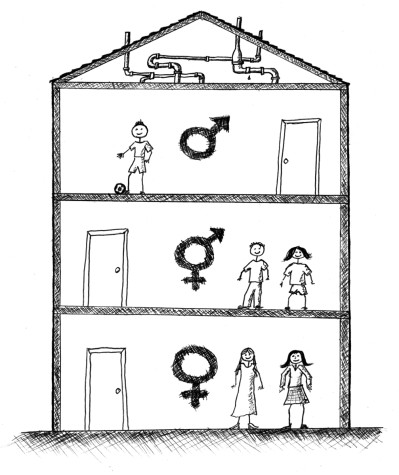Genderqueer Students Navigate Life at Whitman
April 28, 2016
Humans like to categorize, but what happens when someone’s identity does not fit neatly into one category? This is a dilemna that Whitman students who transgender or gender non-binary people face constantly.
At Whitman College, many transgender or gender binary people within the genderqueer community feel as if the Whitman community as a whole generally accepts their gender identities but may not understand them. These genderqueer students also find that it may be hard to understand the nuances of not having one’s sex, gender identity, and gender performance align unless people have lived through that experience themselves, especially when it affects matters like where a person can use a bathroom on campus. Some of these genderqueer people felt that using their preferred pronouns and having welcoming body language towards them made them feel more included.
According to first-year Connel Boken, who is a transwoman, it is difficult to understand what being stuck in a body that misrepresents you when you lack that personal experience.
“I think that understanding is a different story…but I do find that people do try…I look in the mirror and I don’t see my real self every single day. I am constantly fighting off the fact that I am still biologically male,” said Boken.
Transgender and gender non-binary people have differing views on which words best describe their gender identities and gender performances.
“I would be considered trans. You don’t have to be planning a sex reassignment surgery or hormone therapy to be considered trans. Trans just means your gender identity does not match with your sex assigned at birth. So even if you are agender, gender neutral, or gender fluid, that falls under trans,” said first-year Bryn Louise, who is gender fluid.
However, first-year Bil McCafferty, who is a pangender person within the gender non binary community, has another understanding of the meaning of transgender. This shows how students in the genderqueer community each seek to tell their own stories and the stories of people like them in their own ways.
“The [term] I would actually be careful with is actually trans because it is used as an umbrella term, but when you say trans, most people will assume male-to-female or female-to-male, and that can be tricky…be careful with your wording there, because if you label someone who is non binary as trans, there can be backlash,” said McCafferty.
While some genderqueer students may be able to say whatever they want about their identities, some cannot put these words into actions because of potential backlash. One way that this plays out for genderqueer students on Whitman’s campus is through the choices they make about which bathrooms to use and when.
“Lyman has a lot of gender neutral restrooms so I don’t have much of a problem there. Academic Buildings are another matter…In Olin I’ll only use the women’s restrooms if I am there late at night when I can be assured that nobody else is there, mostly to avoid any issues that might pop up,” said Boken to The Pioneer via email.
McCafferty agreed with Boken, and also highlighted how the number of gender neutral bathrooms needs to increase on Whitman campus.
“There are gender neutral bathrooms on campus, so they have at least made that step to try to be inclusive, but location and just numbers are limited,” said McCafferty.
If a student wishes to make genderqueer people feel more welcome, taking simple measures like using the correct pronouns and friendly body language towards transgender and gender non binary students goes a long way.
“Take people seriously when they say, ‘use those pronouns’…And body language, just to know that if I am presenting more feminine, I obviously…look more masculine. Some people are less friendly when they see that, so not being afraid to look, but also not looking too much…Just be friendly and treat gender non-comforming people with the same respect you’d treat everyone else,” said Louise.







